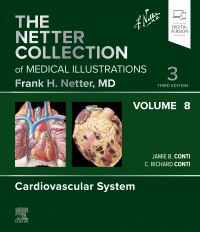
The Netter Collection of Medical Illustrations: Cardiovascular System, Volume 8 - Elsevier E-Book on VitalSource, 3rd Edition
Elsevier eBook on VitalSource

-
- Provides a highly visual guide to the heart and blood vessels, from basic science, anatomy, and physiology to pathology and injury
- Covers new diagnostics and therapeutics, including timely topics like intracardiac echocardiography, optical coherence tomography, radiation dose concerns, and coronary artery spasm
- Provides a concise overview of complex information by integrating anatomical and physiological concepts with clinical scenarios
- Compiles Dr. Frank H. Netter’s master medical artistry—an aesthetic tribute and source of inspiration for medical professionals for over half a century—along with new art in the Netter tradition for each of the major body systems, making this volume a powerful and memorable tool for building foundational knowledge and educating patients or staff
- NEW! An eBook version is included with purchase. The eBook allows you to access all of the text, figures, and references, with the ability to search, make notes and highlights, and have content read aloud
-
SECTION 1 ANATOMY
1.1 Thorax: Lungs in Situ
1.2 Thorax: Heart in Situ
1.3 Thorax: Mediastinum
1.4 Thorax: Pericardial Sac
1.5 Exposure of the Heart: Anterior Exposure
1.6 Exposure of the Heart: Base and Diaphragmatic Surfaces
1.7 Atria and Ventricles: Right Atrium and Right Ventricle
1.8 Atria and Ventricles: Left Atrium and Left Ventricle
1.9 Atria and Ventricles: Atria, Ventricles, and Interventricular Septum
1.10 Valves: Cardiac Valves Open and Closed
1.11 Valves: Valves and Fibrous Skeleton of Heart
1.12 Specialized Conduction System of Heart
1.13 Coronary Arteries and Cardiac Veins: Sternocostal and Diaphragmatic Surfaces
1.14 Coronary Arteries and Cardiac Veins: Arteriovenous Variations
1.15 Innervation of Heart: Nerves of Heart
1.16 Innervation of Heart: Schema of Innervation
SECTION 2 PHYSIOLOGY
2.1 Cardiovascular Examination: Cardiac Cycle
2.2 Cardiovascular Examination: Important Components
2.3 Cardiovascular Examination: Positions for Cardiac Auscultation
2.4 Cardiovascular Examination: Areas of Cardiac Auscultation
2.5 Cardiovascular Examination: Murmurs
2.6 Neural and Humoral Regulation of Cardiac Function
2.7 Physiologic Changes During Pregnancy
2.8 Cardiac Catheterization: Vascular Access
2.9 Cardiac Catheterization: Left-Sided Heart Catheterization
2.10 Cardiac Catheterization: Normal Saturations (O2) and Pressure
2.11 Cardiac Catheterization: Examples of O2 and Pressure Findings and Pressure Tracings in Heart Diseases
2.12 Cardiac Catheterization: Normal Cardiac Blood Flow During Inspiration and Expiration
2.13 Specialized Conduction System: Physiology
2.14 Specialized Conduction System: Electrical Activity of the Heart
2.15 Electrocardiogram
2.16 Electrocardiogram (Continued)
2.17 Progression of Depolarization
2.18 End of Depolarization Followed by Repolarization
2.19 Axis Deviation in Normal Electrocardiogram
2.20 Atrial Enlargement
2.21 Ventricular Hypertrophy
2.22 Bundle Branch Block
2.23 Wolff-Parkinson-White Syndrome
2.24 Atrioventricular Nodal Reentrant Tachycardia
2.25 Sinus and Atrial Arrhythmias
2.26 Premature Contraction
2.27 Sinus Arrest, Sinus Block, and Atrioventricular Block
2.28 Tachycardia, Fibrillation, and Atrial Flutter
2.29 Sudden Cardiac Death
2.30 Effect of Digitalis and Calcium/Potassium Levels on Electrocardiogram
2.31 Cardiac Pacing: Dual Chamber and Biventricular
2.32 Cardiac Pacing: Leadless Technology and Subcutaneous Implantable Cardioverter Defibrillators
SECTION 3 IMAGING
3.1 Radiology: Frontal Projection
3.2 Radiology: Right Anterior Oblique Projection
3.3 Radiology: Left Anterior Oblique Projection
3.4 Radiology: Lateral Projection
3.5 Angiocardiography: Anteroposterior Projection of Right-Sided Heart Structures
3.6 Angiocardiography: Lateral Projection of RightSided Heart Structures
3.7 Angiocardiography: Anteroposterior Projection of Left-Sided Heart Structures
3.8 Angiocardiography: Lateral Projection of Left-Sided Heart Structures
3.9 Catheter-Based Coronary Angiography: Right Coronary Artery
3.10 Catheter-Based Coronary Angiography: Left Coronary Artery
3.11 Intravascular Ultrasound
3.12 Transthoracic Cardiac Ultrasound
3.13 Doppler Echocardiography
3.14 Transesophageal Echocardiography
3.15 Intracardiac Echocardiography
3.16 Optical Coherence Tomography
3.17 Exercise and Contrast Echocardiography
3.18 Myocardial Perfusion Imaging
3.19 Ventriculography
3.20 Computed Tomographic Angiography: Cardiac Cycle and Calcium Contrast Studies
3.21 Computed Tomographic Angiography: Interpretation (Continued)
3.22 Radiation Dose Concerns
3.23 Cardiac Magnetic Resonance Imaging
3.24 Cardiac Magnetic Resonance Imaging (Continued)
SECTION 4 EMBRYOLOGY
4.1 Early Embryonic Development
4.2 Early Intraembryonic Vasculogenesis
4.3 Formation of the Heart Tube: One-Somite and Two-Somite Stages
4.4 Formation of the Heart Tube: Four-Somite and Seven-Somite Stages
4.5 Formation of the Heart Loop: 10-Somite and 14-Somite Stages
4.6 Formation of the Heart Loop: 20-Somite Stage
4.7 Formation of Cardiac Septa: Development of Ventricles and Atrioventricular Valves
4.8 Formation of Cardiac Septa: 27 and 29 Days
4.9 Formation of Cardiac Septa: 31 and 33 Days
4.10 Formation of Cardiac Septa: 37 and 55 Days
4.11 Formation of Cardiac Septa: Heart Tube Derivatives
4.12 Formation of Cardiac Septa: Partitioning of the Heart Tube: Atrial Septation
4.13 Formation of Cardiac Septa: Embryonic Origins, Right and Left Sides
4.14 Development of Major Blood Vessels: 3, 4, and 10 mm
4.15 Development of Major Blood Vessels: 14 mm, 17 mm, and at Term
4.16 Development of Major Blood Vessels: 4, 10, and 14 mm
4.17 Development of Major Blood Vessels: 17 mm, 24 mm, and at Term
4.18 Fetal Circulation and Changes at Birth
4.19 Three Early Vascular Systems
SECTION 5 CONGENITAL HEART DISEASE
5.1 Physical Examination
5.2 Anomalies of the Great Systemic Veins
5.3 Total Anomalous Pulmonary Venous Connection
5.4 Surgery for Anomalous Pulmonary Venous Return
5.5 Anomalies of the Atria
5.6 Defects of the Atrial Septum: Anatomy
5.7 Defects of the Atrial Septum: Surgery
5.8 Defects of the Atrial Septum: Septal Occluder Device
5.9 Endocardial Cushion Defects: Anatomy and Embryology
5.10 Endocardial Cushion Defects: Surgery for Ostium Primum and Cleft Mitral Valve
5.11 Anomalies of Tricuspid Valve: Tricuspid Atresia
5.12 Anomalies of Tricuspid Valve: Glenn Surgery for Tricuspid Atresia
5.13 Anomalies of Tricuspid Valve: Ebstein Anomaly
5.14 Anomalies of Tricuspid Valve: Types of Ebstein Anomaly
5.15 Anomalies of the Ventricular Septum
5.16 Anomalies of the Ventricular Septum (Continued)
5.17 Anomalies of the Ventricular Septum: Transatrial Repair of Ventricular Septal Defect
5.18 Anomalies of Right Ventricular Outflow Tract: Tetralogy of Fallot
5.19 Anomalies of Right Ventricular Outflow Tract: Pathophysiology and Blalock-Taussig Operation for Tetralogy of Fallot
5.20 Anomalies of Right Ventricular Outflow Tract: Corrective Operation for Tetralogy of Fallot
5.21 Anomalies of Right Ventricular Outflow Tract: Repair of Tetralogy of Fallot
5.22 Anomalies of Right Ventricular Outflow Tract: Eise


 as described in our
as described in our 